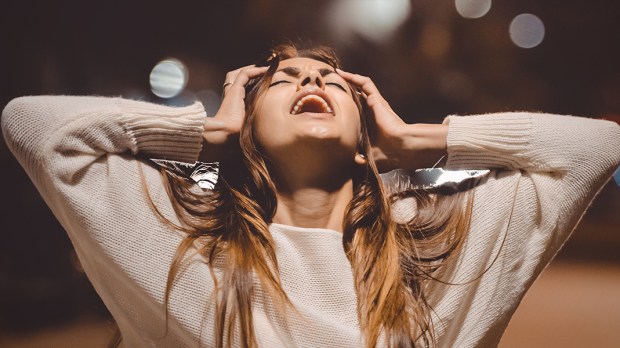We all remember those first stirrings of love — the butterflies in the stomach, the bubble in the chest that spills upward and out in smiles and laughter. Or the first time we got really angry — the full-body flash of heat that settles in the arms, all the muscles locking down, hands clenching reflexively into fists.
Read more:
The real reason we hide our emotions
Of course these emotions are a common human experience, but for the first time scientists have mapped out the signals emotions cause the brain to send to the body. The results are surprisingly consistent across cultures:
People reported that happiness and love sparked activity across nearly the entire body, while depression had the opposite effect: It dampened feelings in the arms, legs and head. Danger and fear triggered strong sensations in the chest area, the volunteers said. And anger was one of the few emotions that activated the arms. The scientists hope these body emoticons may one day help psychologists diagnose or treat mood disorders.
I’ve been fascinated for years by the way emotions trigger automatic physical responses. Anger is easy enough to explain; it’s a defense mechanism that activates the arms, enabling the body to protect what is being threatened (the self, loved ones, land, food). As humans began to settle into communities, overcoming anger and seeking resolution was one of the first challenges. Even today, anger is generally frowned upon as a threat to communal peace and stability (which is why it’s good to have an outlet if, like me, you tend toward flash-anger).
Read more:
The health benefits of having a 'good cry' from time to time
Psychiatrists have recently begun to theorize that anxiety, panic disorder, and obsessive-compulsive disorder were all evolutionary adaptations that allowed ancient societies to thrive. Anxiety might have maintained social hierarchies, panic disorder might have kept tribal members close to home, and OCD might have spurred order and cleanliness.
The commonality of physical responses to emotions across cultures seems to corroborate this theory. For me at least, thinking of mood disorders as evolutionary adaptations helps me get a handle on them. It’s much easier to deal with unexplained anxiety when you can say to yourself, “Oh, this emotion is a leftover evolutionary superpower that would have helped me rock tribal Survivor.” Sadly, this is not tribal Survivor, so I guess I should take some deep breaths and then go kick a vinyl bag full of sand till I feel better.
If you’re not into kicking as the answer to everything, try power posing. According to Amy Cuddy, body language can change the way others think about you, and the way you think about yourself:
[protected-iframe id=”eb08c4593f4676a830698fcee69290d4-95521100-74303997″ info=”https://www.npr.org/player/embed/248198314/248198627″ width=”100%” height=”290″ frameborder=”0″ scrolling=”no”]
If our emotions prompt our brains to send signals to our bodies, it makes sense that our bodies could send messages back to our brains, shifting our emotions.
And if that doesn’t work, try kicking a vinyl bag full of sand.
(Disclaimer: There is no way to “snap out of” clinical depression, anxiety, or OCD. I am not advocating any of this as an answer to serious psychological and mood disorders — I am referring solely to average , mild emotional swings that do not interfere with daily life. If you are experiencing serious depression, anxiety, or compulsive thoughts, please consult a doctor or psychiatrist. Do not try to power pose your way out of it.)

